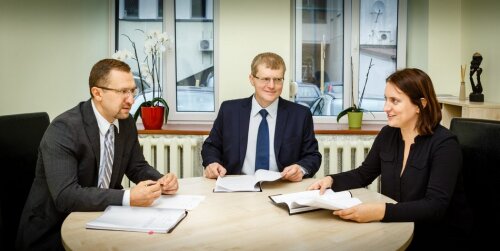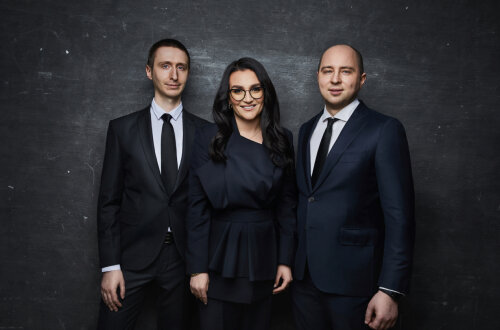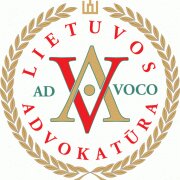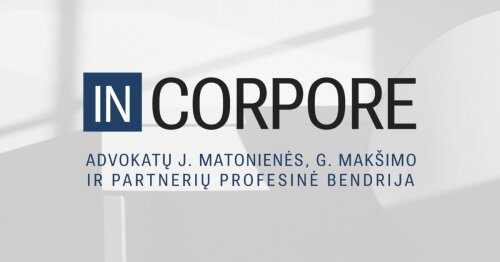Best Probate Lawyers in Republic of Lithuania
Share your needs with us, get contacted by law firms.
Free. Takes 2 min.
Or refine your search by selecting a city:
List of the best lawyers in Republic of Lithuania
About Probate Law in Republic of Lithuania:
Probate in Republic of Lithuania is the legal process of administering the estate of a deceased person. This process includes proving the validity of their will, identifying and inventorying the deceased person's property, paying debts and taxes, and distributing the remaining assets to the beneficiaries as outlined in the will or according to the law.
Why You May Need a Lawyer:
You may need a lawyer to help you navigate the complex legal requirements of probate, especially if you are unfamiliar with the process or if there are disputes among beneficiaries. A lawyer can provide legal advice, representation in court, assistance with paperwork, and help ensure that the probate process is carried out according to the law.
Local Laws Overview:
In Republic of Lithuania, the probate process is governed by the Civil Code. It is important to note that the laws regarding probate can vary depending on the specific circumstances, such as whether the deceased had a will or not. It is advisable to seek legal advice to ensure compliance with the local laws.
Frequently Asked Questions:
1. What is probate?
Probate is the legal process of administering the estate of a deceased person, including proving the validity of their will, inventorying their assets, and distributing them to beneficiaries.
2. Do all estates go through probate in Republic of Lithuania?
Not all estates go through probate in Republic of Lithuania. Estates with assets below a certain threshold or those with named beneficiaries who receive assets outside of the probate process may not need to go through probate.
3. How long does the probate process take in Republic of Lithuania?
The duration of the probate process in Republic of Lithuania can vary depending on the complexity of the estate, the presence of disputes, and other factors. It can range from several months to a few years.
4. Can I challenge a will in Republic of Lithuania?
Yes, you can challenge a will in Republic of Lithuania if you believe it is invalid. Common grounds for challenging a will include lack of capacity, undue influence, or fraud.
5. What happens if someone dies without a will in Republic of Lithuania?
If someone dies without a will in Republic of Lithuania, their estate will be distributed according to the intestacy laws, which determine how assets are distributed among family members. It is important to seek legal advice in such cases.
6. Can I avoid probate in Republic of Lithuania?
There are ways to avoid probate in Republic of Lithuania, such as setting up a trust, naming beneficiaries on certain assets, or holding assets jointly with right of survivorship. It is recommended to seek legal advice to explore these options.
7. How much does probate cost in Republic of Lithuania?
The cost of probate in Republic of Lithuania can vary depending on the complexity of the estate, legal fees, court costs, and other expenses. It is advisable to consult with a lawyer to get an estimate of the potential costs involved.
8. Can I handle probate on my own in Republic of Lithuania?
While it is possible to handle probate on your own in Republic of Lithuania, it can be a complex and time-consuming process. It is recommended to seek legal advice to ensure that the probate process is carried out correctly and efficiently.
9. What are the responsibilities of an executor in Republic of Lithuania?
An executor in Republic of Lithuania is responsible for carrying out the wishes of the deceased as outlined in the will, managing the estate, paying debts and taxes, and distributing assets to beneficiaries. It is important for the executor to act in the best interests of the estate and beneficiaries.
10. How can a lawyer help me with probate in Republic of Lithuania?
A lawyer can help you navigate the probate process, provide legal advice, represent you in court if necessary, assist with paperwork, and ensure that the estate is administered according to the law. A lawyer can also help address any disputes that may arise among beneficiaries.
Additional Resources:
If you are in need of legal advice regarding probate in Republic of Lithuania, you may consider contacting the Lithuanian Bar Association or seeking assistance from a local law firm specializing in probate law.
Next Steps:
If you require legal assistance in probate in Republic of Lithuania, it is advisable to schedule a consultation with a qualified probate lawyer who can assess your specific situation and provide guidance on how to proceed. Be sure to gather all relevant documents and information related to the estate before meeting with the lawyer.
Lawzana helps you find the best lawyers and law firms in Republic of Lithuania through a curated and pre-screened list of qualified legal professionals. Our platform offers rankings and detailed profiles of attorneys and law firms, allowing you to compare based on practice areas, including Probate, experience, and client feedback.
Each profile includes a description of the firm's areas of practice, client reviews, team members and partners, year of establishment, spoken languages, office locations, contact information, social media presence, and any published articles or resources. Most firms on our platform speak English and are experienced in both local and international legal matters.
Get a quote from top-rated law firms in Republic of Lithuania — quickly, securely, and without unnecessary hassle.
Disclaimer:
The information provided on this page is for general informational purposes only and does not constitute legal advice. While we strive to ensure the accuracy and relevance of the content, legal information may change over time, and interpretations of the law can vary. You should always consult with a qualified legal professional for advice specific to your situation.
We disclaim all liability for actions taken or not taken based on the content of this page. If you believe any information is incorrect or outdated, please contact us, and we will review and update it where appropriate.
Browse probate law firms by city in Republic of Lithuania
Refine your search by selecting a city.
















